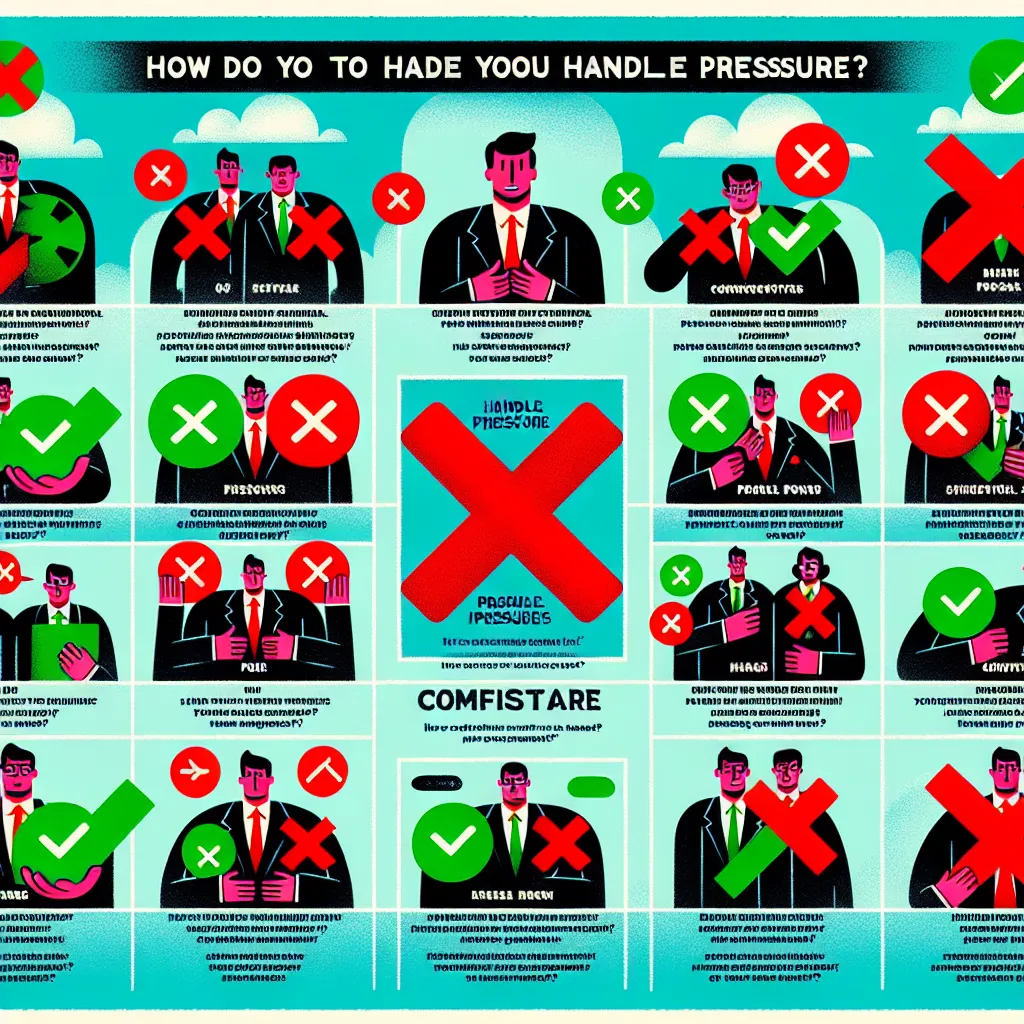Handling pressure is a crucial skill in today’s fast-paced work environment. When interviewers ask, “How do you handle pressure?” they’re looking to gauge your ability to perform under stress and evaluate your problem-solving skills. This question is common in job interviews across various industries and seniority levels. In this article, we’ll explore effective strategies to answer this question, providing you with the confidence to impress your potential employers.
Understanding the Question: Why It’s Asked
Before we dive into how to answer this question, it’s essential to understand why interviewers ask it. They want to:
- Assess your self-awareness
- Evaluate your coping mechanisms
- Determine if you can maintain productivity under stress
- Gauge your potential fit within their work culture
The Interviewer’s Perspective
Interviewers are looking for candidates who can:
- Remain calm and composed in high-pressure situations
- Use stress as a motivator rather than a deterrent
- Prioritize tasks effectively when under pressure
- Maintain quality work despite time constraints or other pressures
 Interview Pressure
Interview Pressure
Crafting Your Answer: Key Components
When answering this question, focus on demonstrating the following:
- Self-awareness
- Positive attitude
- Specific strategies
- Real-life examples
Sample Answer Framework
Here’s a structure you can follow:
- Acknowledge the importance of handling pressure
- Briefly mention your general approach
- Provide a specific example
- Explain the strategies you used
- Highlight the positive outcome
Effective Strategies to Handle Pressure
When discussing how you handle pressure, consider mentioning these strategies:
- Prioritization and organization
- Breaking tasks into smaller, manageable steps
- Time management techniques
- Mindfulness and stress-reduction practices
- Seeking support or delegation when appropriate
Example Answer
“I view pressure as a natural part of any job and often find it motivates me to perform at my best. My approach is to stay organized and prioritize tasks. For instance, in my previous role as a project manager, we faced a tight deadline for a major client presentation. I broke down the project into smaller tasks, delegated responsibilities to team members based on their strengths, and implemented daily check-ins to track progress. This approach helped us complete the project on time and the client was extremely satisfied with our work.”
Common Mistakes to Avoid
When answering this question, steer clear of these pitfalls:
- Claiming you never feel pressure (this can seem unrealistic)
- Focusing too much on how pressure affects you negatively
- Providing vague answers without specific examples
- Indicating that you crumble under pressure
 Pressure Mistakes
Pressure Mistakes
Follow-up Questions and How to Answer Them
Interviewers might ask follow-up questions to delve deeper into your ability to handle pressure. Here are some examples with suggested answers:
-
“Can you describe a time when you had to work under significant pressure?”
Answer: Provide a specific example, detailing the situation, your actions, and the positive outcome. -
“How do you prioritize tasks when everything seems urgent?”
Answer: Explain your method for assessing urgency and importance, such as using an Eisenhower Matrix. -
“How do you maintain work-life balance during high-pressure periods?”
Answer: Discuss strategies like setting boundaries, practicing self-care, and effective time management. -
“What’s the most stressful situation you’ve faced at work, and how did you handle it?”
Answer: Choose a challenging situation, focus on your problem-solving approach, and highlight the positive resolution. -
“How do you help your team members handle pressure?”
Answer: Discuss leadership strategies like open communication, providing support, and leading by example.
Tailoring Your Answer to Different Career Levels
Your approach to handling pressure may vary depending on your career level. Here’s how to tailor your answer:
Entry-Level Candidates
Focus on:
- Academic experiences that required handling pressure
- Internship or part-time job experiences
- Personal strategies for managing stress and deadlines
Mid-Level Professionals
Emphasize:
- Specific work-related examples
- How you’ve improved your pressure-handling skills over time
- Strategies for managing team pressure
Senior-Level Executives
Highlight:
- High-stakes situations you’ve navigated
- How you lead teams through pressure
- Strategic decision-making under pressure
Conclusion
Answering “How do you handle pressure?” effectively can significantly impact your interview success. By demonstrating self-awareness, a positive attitude, and specific strategies backed by real-life examples, you can impress interviewers and showcase your ability to thrive in challenging work environments. Remember to practice your response and tailor it to your experience level and the specific job requirements.
For more interview tips, check out our articles on how to answer questions about emotional intelligence and how to talk about your problem-solving experience in English.




